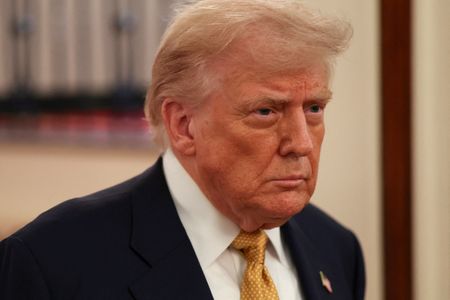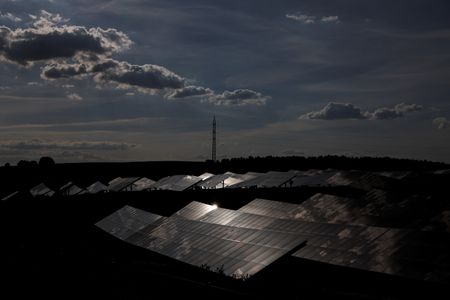By Michael Kahn
PRAGUE (Reuters) – Estonia, a Baltic country of 1.4 million people that has long punched far above its weight in the tech sector, is now leading central and eastern Europe’s rush to fund defence projects spurred by Russia’s 2022 invasion of Ukraine.
It is not hard to see why.
While heightened security concerns have boosted defence investment across Europe, nowhere is Russia’s threat perceived so acutely as in Estonia and its Baltic neighbours, which border Russia and spent decades under Moscow’s rule during the Soviet Union era.
“Philosophically, Estonians think about how to defend the country every day,” says tech entrepreneur Sten Tamkivi.
The early-stage Skype executive told Reuters the war spurred him and his London partners to tap their 800 million euro investment platform Plural – which also includes TransferWise co-founder Taavet Hinrikus – for defence projects and others that support European sovereignty.
“We never came into this saying we want to do defence but growing tension in NATO’s eastern flank is tactile,” Tamkivi said, noting a growing number of defence pitches and foreign investors scouring for opportunities in the sector.
“We need to solve the urgent problem of defence first,” he said.
For example, last July Plural joined the 450 million euro Series C funding in German AI company Helsing, which uses data to bolster defence, intelligence and national security systems, and has closed another defence deal so far in 2025.
According to data from Dealroom.co, the share of European defence tech investments has risen to 1.7% of venture capital funding in 2024 from just 0.4% in 2022, reaching nearly $1 billion.
Much of the money flows to western Europe but the number of funding rounds has tripled in central and eastern Europe since Russia invaded Ukraine in 2022, Dealroom.co data showed.
European Union member Estonia plays an outsized role in its eastern flank. As a home to several tech Unicorns – startups that reached a $1 billion valuation, such as Skype, Bolt, TransferWise and others – it has minted scores of wealthy tech executives with the financial heft to support emerging defence companies.
Its proximity to Ukraine also allows close cooperation with front-line units there to quickly test and tweak technology while the privately-funded groups in the Baltic nation are able to invest in purely military technologies. In contrast, in Poland – the region’s biggest economy and major provider of military aid to Kyiv – many venture firms receive public funding which prevents them from directly financing military projects.
Still, funds supporting defence projects also emerge elsewhere in the region.
Vojta Rocek, a partner at Prague-based Presto Ventures, told Reuters his firm’s new 150 million euro fund launched in partnership with Czech arms maker CSG plans investments in defence-focused startups.
Since last spring, the team has reviewed more than 1,500 pitches, held calls with more than 600 teams and short-listed 60 startups, resulting in three closed deals and three more nearing completion, Rocek said. He said cyber security, quantum computing and AI represent main areas of focus.
STRAIGHT TO BATTLEFIELD
Ragnar Sass, the founder of Tallinn-based Darkstar – a consortium of tech entrepreneurs and former military officers – told Reuters technology offering the best prospects of rapid deployment to the Ukraine battlefield such as drone thermal cameras and software systems is most appealing.
For example, Darkstar recently invested in drone data analytic company Farsight, said Sass who estimated defence startups numbered around 100 compared to 10 a few years ago.
“In the last few months there has been a big change among the sentiment of investors,” said Sass, the founder of Estonian unicorn Pipedrive. “I haven’t seen a sector developing as fast as I’ve seen now.”
Growing venture capital interest across eastern Europe promises to fill a funding gap defence technology startups face because of banks’ reluctance to lend on fears of falling foul of environmental, social and governance regulations, which also limit public funding, investors say.
“We were a little doubtful we would see enough pitch decks in the defence space but the number is growing each month,” said Presto Ventures’ Rocek. “Everybody woke up. People thought the war would end swiftly and it has not.”
Governments in the region are also starting to act. The Czechs have launched a programme to co-finance small enterprises in the sector to spur its development, Radka Konderlova, the defence ministry official in charge of cooperation with industry, told Reuters.
In Estonia, the government last month launched a 100 million euro fund for the emerging defence tech sector, said Sille Pettai, chief executive and fund manager at SmartCap, which will manage the funds.
The longer term goal is to attract global investors to a tech ecosystem now supported by what she calls “patriotic capital” of local wealthy tech entrepreneurs. The Estonian defence industry aims to hit 2 billion euros in revenue by 2030, up from a current 500 million euros and with a focus on disruptive offensive defence technologies, she said.
“Defending a small country is expensive. We need to be smart and know where our strengths are, so we built on technology,” Pettai told Reuters.
(Reporting by Michael Kahn, Editing by Tomasz Janowski)










